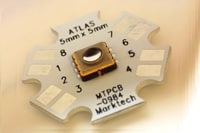Samsung Electronics, a leader in advanced memory technology, presented groundbreaking innovations at its annual Memory Tech Day. Attended by 600 industry experts, customers, and partners, the event served as a platform to introduce new products and discuss Samsung’s long-term plans for the ever-changing tech landscape.
Jung-Bae Lee, President and Head of Memory Business at Samsung Electronics, outlined the company’s strategies for the hyperscale era. He detailed innovations in transistor structures and materials, including 3D structures for sub-10-nanometer (nm) DRAM, paving the way for larger single-chip capacities exceeding 100 gigabits (Gb). Samsung is also progressing toward 1,000-layer vertical NAND (V-NAND) technology, a significant leap in NAND flash breakthroughs.
Samsung unveiled its next-generation HBM3E DRAM named Shinebolt, designed to power next-gen AI applications with impressive speeds of 9.8 gigabits-per-second (Gbps) per pin, enabling transfer rates exceeding 1.2 terabytes-per-second (TBps). Other products showcased included the 32Gb DDR5 DRAM, the industry’s first 32Gbps GDDR7, and the petabyte-scale PBSSD, enhancing storage capabilities for server applications.
In response to evolving AI technologies, Samsung introduced memory solutions supporting high-performance, high-capacity, low-power, and small form factors for edge devices. Among them, the 7.5Gbps LPDDR5X CAMM21 and the 9.6Gbps LPDDR5X DRAM are set to revolutionize the next-generation PC and laptop DRAM market.
With the rise of autonomous driving solutions, Samsung presented its Detachable AutoSSD, enabling data access from a single SSD to multiple System on Chips (SoCs) through virtual storage. This detachable SSD supports sequential read speeds of up to 6,500 megabytes-per-second (MBps) with 4TB of capacity, simplifying upgrades for vehicle users and manufacturers.
Samsung emphasized its commitment to environmental sustainability. The company plans to develop ultra-low-power memory technologies to decrease power consumption in data centers, PCs, and mobile devices. Additionally, Samsung will incorporate recycled materials in portable SSD products, contributing to reduced carbon footprint. These initiatives align with Samsung’s sustainability initiative, “technology that makes technology sustainable,” demonstrating the company’s dedication to mitigating climate impact.






